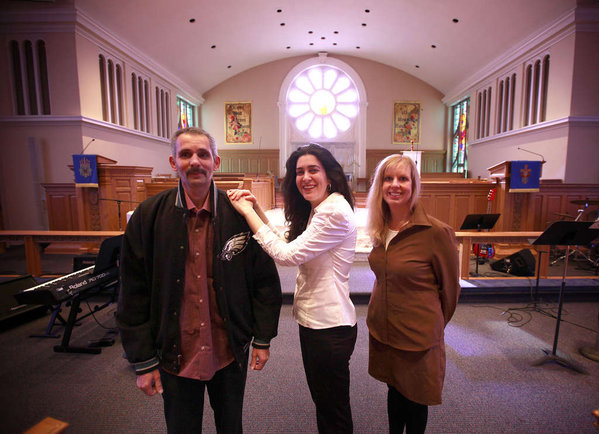How one woman's unfunded health-care charity saves lives
 DAVID SWANSON / Staff Photographer
DAVID SWANSON / Staff Photographer
With CrossLink Med, founder Sandra Khalil (center) of Hatfield helps people navigate the health-care system. With volunteer Sharon Goldberg, she helped save Awad Abdalla (left).
ROBERT CALANDRA, FOR THE INQUIRER
Sandra Khalil is one broke woman.
She lives in a ramshackle house in Hatfield, has no income or health insurance, and drives an ornery car whose display panel flashes "STOP" in red when she starts it.
Khalil could be a comfortable woman. She is a trained engineer with a specialty in biomedical engineering and an M.B.A. She spent 12 years working for drug giants Johnson & Johnson and Merck & Co. as a process engineer. She was on the fast track to senior management.
But after a layoff, she traded the big bucks, the gilded health insurance plan, and a car with manners for a life of helping people without health insurance find care. Two years ago, she established CrossLink Med (crosslinkmed.org), a charity that helps people, regardless of finances or life circumstances, navigate the health system to get the care they need.
"This is something that I feel called to by God," said Khalil, 38, a Coptic Christian who wears a simple wooden cross tied to a string around her neck. "I'm passionate about it."
She was hoping the Affordable Care Act would provide insurance for her and most of the people she helps, and was disheartened when Pennsylvania did not accept the expansion of Medicaid. CrossLink is teaming up with Resources for Human Development for an event in early December to sign up 200 people.
The people she helps range from immigrants to single adults who cannot get Medicaid, and those who have insurance but cannot sustain the premiums.
A victim of downsizing in the pharmaceutical industry, Khalil became a consultant in 2008. That project ended, and she hoped to work for a small drugmaker or biotech firm. Her resume found no takers.
"It just felt like the doors were closing," Khalil said. "The one door that was open was devoting my life to service."
Traversing the city and suburbs, Khalil volunteered in nursing homes and homeless shelters and prayed with sick people.
She established CrossLink Med in early 2011. It wasn't long before people, many from Montgomery County's Egyptian Coptic community, found her. She says she fields 20 to 25 calls a day for help.
To date, CrossLink has helped more than 200 people navigate the system, said Khalil. Not bad for a charity with a three-member board and a cluttered kitchen table for an office. Khalil is the only staff member and doesn't get paid. Volunteers like Sharon Goldberg, a retired microbiologist from North Wales, pitch in when they can.
"I hope one day a philanthropist will come so we can do more," Khalil said.
Her most challenging case involved Awad Abdalla, 46, an Egyptian who immigrated here in mid-2011. A week later, he was writhing with stomach pain. Abdalla was illiterate in Arabic and spoke no English. So a friend contacted Khalil, who rushed him to Abington Memorial Hospital. Stabilized but still in pain, Abdalla was about to be discharged when Khalil interceded.
"I said, 'You can't do this to this man. You have to admit him,' " Khalil said. "I was relentless."
The doctor eventually agreed. Only later was it discovered that Abdalla's stomach pain came from a large rectal tumor caused by a rare genetic disorder. If not removed, it would have killed him in a few months. He was transferred to Fox Chase Cancer Center where, after 11 hours of surgery, the tumor was removed. Today, he is cancer-free.
"Sandy was literally critical to saving this patient's life," says physician Claresa Levetan of Chestnut Hill Hospital. "Without her serving as a translator, caregiver, and humanitarian, he would not be alive today."
Abdalla needed chemotherapy after surgery. But traveling to and from a cancer center wasn't feasible. So the engineer huddled with the doctor and devised a solution: Abdalla would get a chemo pill.
"The difference in cost between chemo infusion and the pill was $150,000," she said. "We really saved money for the government and the people."
In May, CrossLink Med scored another coup when it screened more people than any other group in the state during Hepatitis C Day, according to the Pennsylvania Department of Health.
So how did a tiny, unfunded charity best the big groups? By using electronic records and free software with a secure network. "Being an engineer, I love technology and innovation," Khalil said. "But without money we're limited. We need funding."
Read the original article at:
Robert Calandra can be reached
at 215-836-0101 or This email address is being protected from spambots. You need JavaScript enabled to view it..
This article was produced in partnership with Kaiser Health News, an editorially independent program of the Henry J. Kaiser Family Foundation, a nonprofit, nonpartisan health-policy research and communication organization not affiliated with Kaiser Permanente.

